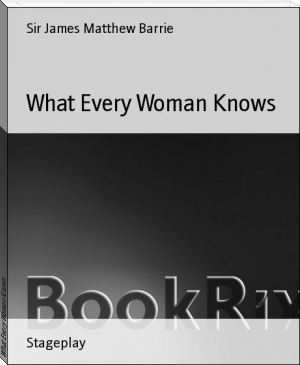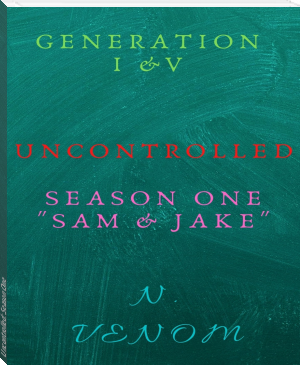Alice Sit-By-The-Fire - Sir James Matthew Barrie (epub ebook reader .TXT) 📗

- Author: Sir James Matthew Barrie
Book online «Alice Sit-By-The-Fire - Sir James Matthew Barrie (epub ebook reader .TXT) 📗». Author Sir James Matthew Barrie
I
One would like to peep covertly into Amy's diary (octavo, with the word 'Amy' in gold letters wandering across the soft brown leather covers, as if it was a long word and, in Amy's opinion, rather a dear). To take such a liberty, and allow the reader to look over our shoulders, as they often invite you to do in novels (which, however, are much more coquettish things than plays) would be very helpful to us; we should learn at once what sort of girl Amy is, and why to-day finds her washing her hair. We should also get proof or otherwise, that we are interpreting her aright; for it is our desire not to record our feelings about Amy, but merely Amy's feelings about herself; not to tell what we think happened, but what Amy thought happened. The book, to be sure, is padlocked, but we happen to know where it is kept. (In the lower drawer of that hand-painted escritoire.) Sometimes in the night Amy, waking up, wonders whether she did lock her diary, and steals downstairs in white to make sure. On these occasions she undoubtedly lingers among the pages, re-reading the peculiarly delightful bit she wrote yesterday; so we could peep over her shoulder, while the reader peeps over ours. Then why don't we do it? Is it because this would be a form of eavesdropping, and that we cannot be sure our hands are clean enough to turn the pages of a young girl's thoughts? It cannot be that, because the novelists do it. It is because in a play we must tell nothing that is not revealed by the spoken words; you must find out all you want to know from them; there is no weather even in plays nowadays except in melodrama; the novelist can have sixteen chapters about the hero's grandparents, but we cannot even say he had any unless he says it himself. There can be no rummaging in the past for us to show what sort of people our characters are; we are allowed only to present them as they toe the mark; then the handkerchief falls, and off they go.
So now we know why we must not spy into Amy's diary. Perhaps we have not always been such sticklers for the etiquette of the thing; but we are always sticklers on Thursdays, and this is a Thursday.
As you are to be shown Amy's room, we are permitted to describe it, though not to tell (which would be much more interesting) why a girl of seventeen has, as her very own, the chief room of a house. The moment you open the door of this room (and please, you are not to look consciously at the escritoire as if you knew the diary was in it) you are aware, though Amy may not be visible, that there is an uncommonly clever girl in the house. The door does not always open easily, because attached thereto is a curtain which frequently catches in it, and this curtain is hand-sewn (extinct animals); indeed a gifted woman's touch is everywhere; if you are not hand-sewn you are almost certainly hand-painted, but incompletely, for Amy in her pursuit of the arts has often to drop one in order to keep pace with another. Some of the chairs have escaped as yet, but their time will come. The table-cover and the curtains are of a lovely pink, perforated ingeniously with many tiny holes, which when you consider them against a dark background, gradually assume the appearance of something pictorial, such as a basket of odd flowers. The fender stool is in brown velvet, and there are words on it that invite you to sit down. Some of the letters of this message have been burned away. There are artistic white bookshelves hanging lopsidedly here and there, and they also have pink curtains, no larger than a doll's garments. These little curtains are for covering the parts where there are no books as yet. The pictures on the walls are mostly studies done at school, and include the well-known windmill, and the equally popular old lady by the shore. Their frames are of fir-cones, glued together, or of straws which have gone limp, and droop like streaks of macaroni. There is a cosy corner; also a milking-stool, but no cow. The lampshades have had ribbons added to them, and from a distance look like ladies of the ballet. The flower-pot also is in a skirt. Near the door is a large screen, such as people hide behind in the more ordinary sort of play; it will be interesting to see whether we can resist the temptation to hide some one behind it.
A few common weeds rear their profane heads in this innocent garden; for instance a cruet-stand, a basket of cutlery, and a triangular dish of the kind in which the correct confine cheese. They have not strayed here, they live here; indeed this is among other things the dining- room of a modest little house in Brompton made beautiful, or nearly so, by a girl, who has a soul above food and conceals its accessories as far as possible from view, in drawers, even in the waste-paper basket. Not a dish, not a spoon, not a fork, is hand-painted, a sufficient indication of her contempt for them.
Amy is present, but is not seen to the best advantage, for she has been washing her hair, and is now drying it by the fire. Notable among her garments are a dressing-jacket and a towel, and her head is bent so far back over the fire that we see her face nearly upside-down. This is no position in which we can do justice to her undoubted facial charm. Seated near her is her brother Cosmo, a boy of thirteen, in naval uniform. Cosmo is a cadet at Osborne, and properly proud of his station, but just now he looks proud of nothing. He is plunged in gloom. The cause of his woe is a telegram, which he is regarding from all points of the compass, as if in hopes of making it send him better news. At last he gives expression to his feelings. 'All I can say,' he sums up in the first words of the play, 'is that if father tries to kiss me, I shall kick him.'
If Amy makes any reply the words arrive upside-down and are unintelligible. The maid announces Miss Dunbar. Then Amy rises, brings her head to the position in which they are usually carried; and she and Ginevra look into each other's eyes. They always do this when they meet, though they meet several times a day, and it is worth doing, for what they see in those pellucid pools is love eternal. Thus they loved at school (in their last two terms), and thus they will love till the grave encloses them. These thoughts, and others even more beautiful, are in their minds as they gaze at each other now. No man will ever be able to say 'Amy,' or to say 'Ginevra,' with such a trill as they are saying it.
'Ginevra, my beloved.'
'My Amy, my better self.'
'My other me.'
There is something almost painful in love like this.
'Are you well, Ginevra?'
'Quite well, Amy.'
Heavens, the joy of Amy because Ginevra is quite well.
'How did my Amy sleep?'
'I had a good night.'
How happy is Ginevra because Amy has had a good night. All this time they have been slowly approaching each other, drawn by a power stronger than themselves. Their intention is to kiss. They do so. Cosmo snorts, and betakes himself to some other room, his bedroom probably, where a man may be alone with mannish things, his razor, for instance. The maidens do not resent his rudeness. They know that poor Cosmo's time will come, and they are glad to be alone, for they have much to say that is for no other mortal ears. Some of it is sure to go into the diary; indeed if we were to put our ear to the drawer where the diary is we could probably hear its little heart ticking in unison with theirs.
It is Ginevra who speaks first. She is indeed the bolder of the two. She grips Amy's hand and says quite firmly, 'Amy, shall we go to _another_ to-night?' This does not puzzle Amy, she is prepared for it, her honest grey eyes even tell that she has wanted it, but now that it is come she quails a little. 'Another theatre?' she murmurs. 'Ginevra, that would be five in one week.'
Ginevra does not blanch. 'Yes,' she says recklessly, 'but it is also only eight in seventeen years.'
'Isn't it,' says Amy, comforted. 'And they have taught us so much, haven't they? Until Monday, dear, when we went to our first real play we didn't know what Life is.'
'We were two raw, unbleached school-girls, Amy--absolutely unbleached.'
It is such a phrase as this that gives Ginevra the moral ascendancy in their discussions.
'Of course,' Amy ventures, looking perhaps a little unbleached even now, 'of course I had my diary, dear, and I do think that, even before Monday, there were things in it of a not wholly ordinary kind.'
'Nothing,' persists Ginevra cruelly, 'that necessitated your keeping it locked.'
'No, I suppose not,' sadly enough. 'You are quite right, Ginevra. But we have made up for lost time. Every night since Monday, including the matinee, has been a revelation.'
She closes her eyes so that she may see the revelations more clearly. So does Ginevra.
'Amy, that heart-gripping scene when the love-maddened woman visited the _man_ in his _chambers_.'
'She wasn't absolutely love-maddened, Ginevra; she really loved her husband best all the time.'
'Not till the last act, darling.'
'Please don't say it, Ginevra. She was most foolish, especially in the crepe de chine, but _we_ know that she only went to the man's chambers to get back her letters. How I trembled for her then.'
'I was strangely calm,' says Ginevra the stony hearted.
'Oh, Ginevra, I had such a presentiment that the husband would call at those chambers while she was there. And he did. Ginevra, you remember his knock upon the door. Surely you trembled then?'
Ginevra knits her lips triumphantly.
'Not even then, Amy. Somehow I felt sure that in the nick of time her lady friend would step out from somewhere and say that the letters were _hers_.'
'Nobly compromising herself, Ginevra.'
'Amy, how I love that bit where she says so unexpectedly, with noble self-renunciation, "He is my affianced husband."'
'Isn't it glorious. Strange, Ginevra, that it happened in each play.'
'That was because we always went to the thinking theatres, Amy. Real plays are always about a lady and two men; and alas, only one of them is her husband. That is Life, you know. It is called the odd, odd triangle.'
'Yes, I know.' Appealingly, 'Ginevra, I hope it wasn't wrong of me to go. A month ago I was only a school-girl.'
'We both were.'
'Yes, but you are now an art student, in lodgings, with a latchkey of your own; you have no one dependent on you, while I have a brother and sister to--to form.'
'You must leave it to the Navy, dear, to form Cosmo, if it can; and as the sister is only a baby, time enough to form her when she





Comments (0)